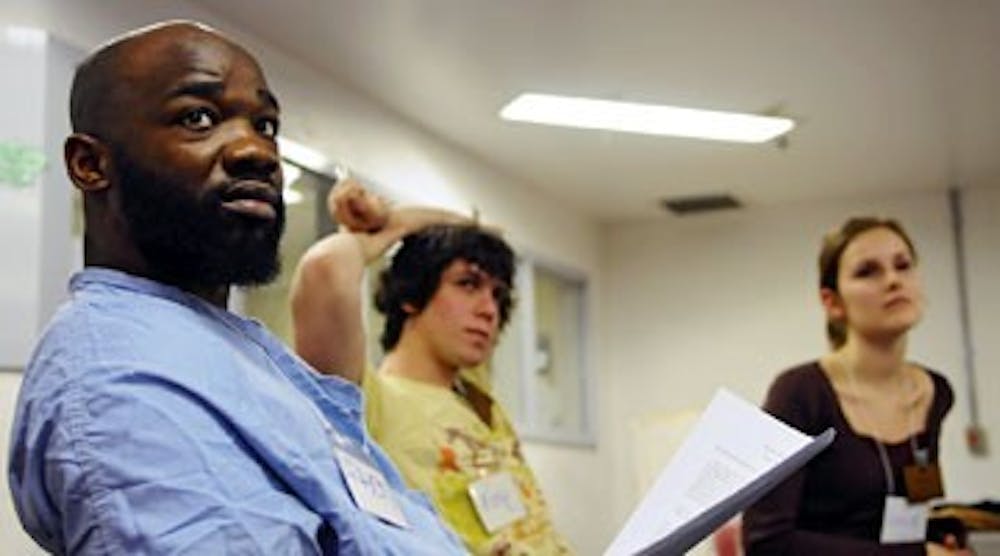
See a photo slideshow from the class here.
"I've killed two people, I have a great personality and I've been skydiving," Gee said as he introduced himself to his fellow Political Science 435 students in an icebreaker exercise.
Not your typical introduction, but then again, nor is this your typical Penn class. That's because about half the students taking 'Inside-Out: The Politics of Crime and Punishment' -- including Gee -- are inmates at the Philadelphia Industrial Correctional Center.
Every week, about 15 Penn students make the 20-minute drive to the jail to discuss questions of crime and justice alongside classmates who have experienced the issues firsthand.
The reason for the introductory games at this late stage in the semester - in which the other students had to guess which of Gee's three statements about himself is untrue -- is that professor Marie Gottschalk never knows exactly who will be in class until she arrives at the county jail in North Philadelphia.
Trials, paroles, transfers to state prisons and releases mean that the "inside students" drop in and out of the program, which was founded at Temple University in 1997 but now runs nationwide with over 5,000 participants.
While interaction between inside and outside students is the fundamental goal of the three-hour weekly class, the unique program's survival is made possible only by a strict set of rules that all students must keep to.
Classroom interaction occurs on a first-name only basis, outside students are required to dress modestly and there is to be absolutely no contact between inside and outside students at any point outside the classroom.
After Gottschalk had run through these rules for the inside students joining the class this week, students took part in icebreaker drills to encourage an atmosphere of sharing.
Penn students found out that inside student Dallas is a certified brick mason, that Terrence likes to sing in the shower and that Jack likes rice with every meal.
But the icebreaker exercises also provided a vehicle for more profound exchange.
In an exercise where students had to choose whether they were more like New York City or Colorado, inside student Gary chose New York "because I feel run down, claustrophobic and strangled," he said.
With the icebreakers over, Gottschalk introduced the topic of this week's class: Race and the Carceral System.
"We cannot ignore the fact that we come every week to a jail that's 90-percent black, whereas the vast majority of Penn students are white," she said, before opening the floor for students to share their thoughts about race in America.
Inside student Zack, who like most PICC inmates is black, described how he experiences race.
"Even if I'm walking down the street not doing anything wrong, the thought that I'm going to get stopped by the police is always on my mind - it's just a constant feeling," he said.
In contrast to the frank discussion happening inside the prison chapel where the classes are held, outside student Noah commented on how upper- and middle-class white people tend to shy away from addressing race directly.
Inside student Gee had a very different experience in the black community.
"We talk about race all the time," he said. "Having an open conversation about white and black is no big issue for us."
As professor Gottschalk encouraged students to relate their thoughts about race to the prison system, students split into small groups to discuss the week's readings.
Inside students were able to complement the academic readings on the prison system with their personal experiences.
In a discussion of the symbolic role of violence in prison life, inside students Gary and Ramos spoke of how they had both been assaulted in jail.
And while one reading argued that prison life is based on a hierarchy of violence, inside student Hassan said those who are quiet and respectful are the ones who survive best in jail.
The class ended with a discussion of how people end up in prison, and what inside students felt about their prospects on the outside after their release.
Dallas spoke articulately of his desire for a different life on the outside.
"I feel in my bones that I'm done with prison and my old life," he said.
Terrence echoed these feelings: "I've been incarcerated for a long time now," he said, "and I'm tired of it. I know how to get a job and how to work, and I just want to give myself a chance."
It seemed a lot had been shared by the time the three hours were up.
"The course is definitely intense and perhaps not for everyone," outside student Sarah said, "but I would still encourage everyone at Penn to take it."
Public Information Officer for the Philadelphia Prison System Robert Eskind also felt the program benefited the inside students.
"Our guys are hungry for knowledge," he said, "and the opportunity for them to take part in a college-level course allows them to share their unique knowledge and feel that they are valued."
And in case anyone was wondering, Gee's brother is a sergeant major in the army and arranged for him to do a sky dive. He has not killed two people.
The Daily Pennsylvanian is an independent, student-run newspaper. Please consider making a donation to support the coverage that shapes the University. Your generosity ensures a future of strong journalism at Penn.
DonatePlease note All comments are eligible for publication in The Daily Pennsylvanian.








